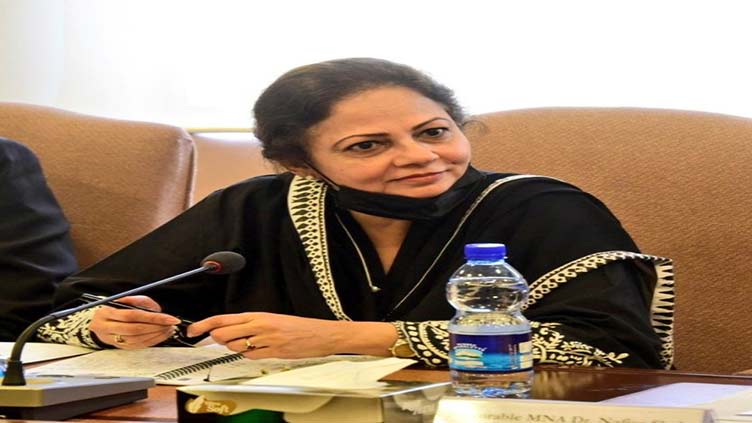Pakistan’s national consensus for cohesion, unity must to overcome pressing challenges: Pasha

Pakistan
Pakistan’s national consensus for cohesion, unity must to overcome pressing challenges: Pasha
ISLAMABAD (Dunya News) - Minister of State for Finance and Revenue Dr Aisha Ghaus Pasha on Thursday said that the country needed a broad based national consensus to ensure cohesion and unity among the ranks and files of the nation to overcome pressing challenges.
Addressing the Islamabad Policy Research Institute (IPRI) Grand National Dialogue seminar on National Identity and Cohesion: Unity In Diversity , the Minister underlined the key areas demanding focus of the stakeholders to improve the country’s social and economic conditions.
Dr Pasha said there were 11 key areas of focus that needed to have national consensus so as a nation to decide to take painful reforms for progress and prosperity of the country.
She added that improving governance, resource mobilisation, accelerating growth, balanced regional development and other priority areas with focus on human development, provision of employment opportunities would demand a unified response for building a strong nation.
“It is high time that everyone in Pakistan including our youth should sit together to create that country that was achieved after many sacrifices in 1947. We need to foster patriotism and national cohesion by upholding the principles of diversity. The youth is our asset and the stakeholders have to forget their past and sit together to reform, rebuild and act together.”
Expressing her optimism, the Minister of State said the country could achieve its mission of a self reliant state with unity.
She mentioned that the crises of our identity was persistent throughout the creation of the country, adding that the vested interests of the disgruntled politicians impeded the journey of democracy, and national cohesion.
“We lost our vision of human development to the personal interests and ambitions of the politicians. Despite being the sixth most populated country, we are the lowest in human development index.”
She added that the countries were secure with human security amid fifth generation warfare phenomenon prevailing in the present age.
“It is territorial security, food, economic security, good and quality employment, shelter, no regional disparity and others that safeguard national security.”
Minister Pasha underlined that good governance was one of the mechanisms to ensure our security alongwith environment security to protect ourselves.
“We are in a stage of IMF programme and the nations opt so when they are unable to meet their economic needs. We have availed 23 IMF programmes since 1990,” she said.
She added that the country’s foreign exchange reserves were not in a comfortable position because there were huge imports and export less which was due least priority focus to exports.
“As a nation, we will have to learn to live within our means,” she concluded.
In his welcome address, President IPRI, Ambassador (R) Dr Raza Mohammad briefed the participants that this was the third seminar in the series of IPRI Grand National Dialogue that started from economic security theme.
The seminar, he said had two objectives one to understand identity and the second to comprehend cohesion.
“Pakistan has gone through many severe problems during its initial times after independence and it faced wars, economic crises and also terrorism that impacted our social economic development and national cohesion.”
He added that the crises also created deprivation in other provinces of the country that started creating fissures in our national fabric which were exploited by the inimical elements.
Ambassador (R) Mohammad said the Father of the Nation, Quaid-e-Azam Mohammad Ali Jinnah emphasized on national cohesion and unity and meritocracy in his famous August 11, 1947 address. “Diversity resides in our culture and languages we speak that binds us together,” he added.
Former Foreign Secretary Ambassador (R) Riaz Mohammad Khan was of the view that Pakistan’s struggle was very simple yet complicated as the purpose was simple- safeguarding the rights of Muslims of India-but the complexity was in the means and process of the struggle that took thirty years of effort amid intricate twists and turns to achieve the separate homeland.
“The Quaid-e-Azam’s speech of August 11, 1947 is the only guiding document on nation building,” he added.
Commenting on the identity markers, he said Pakistan was a multicultural and multi-ethnic country with an historic background of its struggle for freedom. “Indus should be taken as the identity marker of Pakistan due to archaic significance in the indigenous human civilization.”
He further said the religious diversity and history were also our identity markers, adding.
He mentioned the famous quote of Indian Prime Minister Indira Gandhi saying, “India missed out industrial revolution and must not miss out the technological revolution.” He added that Indira Gandhi’s statement clearly outmaneuvered her vision for a strong nation.
Former Chief Minister Balochistan, Dr Abdul Malik Baloch said that complete democracy, federal system, supremacy of people’s rule, and acceptance of diversity and languages would guarantee political and economic progress of the nation.

